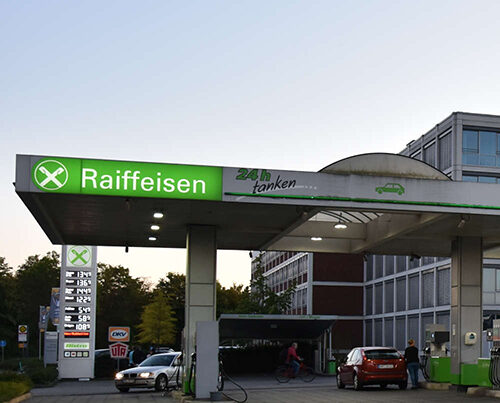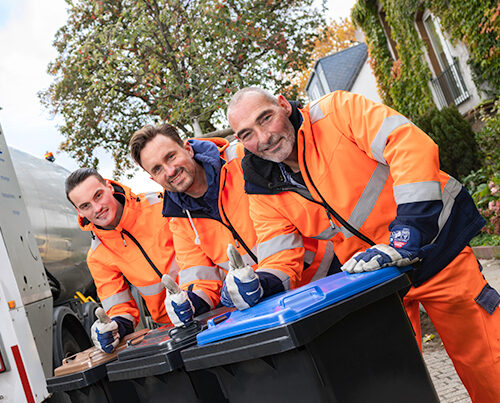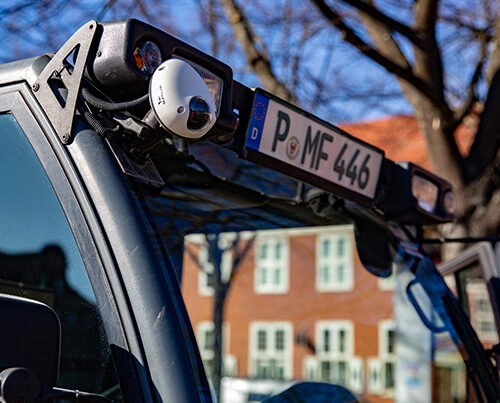Sascha Hähnke, managing director of REMONDIS Sustainable Services, is an experienced logistics specialist and has in-depth knowledge of the mobility sector having worked in the industry for many decades and built up a network of contacts across all key areas of business and politics. While he argues passionately for alternative concepts and new approaches to be implemented, he also insists that there must be clarity in this matter and vehemently opposes ideological debates.
In a recent interview, he outlined the complex situation in the mobility market and talked about the exciting alternatives, projects and developments, for example in the field of alternative fuels; Germany – the land of cars – may possibly be in the process of reinventing itself!
“Here at REMONDIS, we believe in a mix of different fuels and have always been open to new kinds of technologies and alternative fuels.”
Sascha Hähnke, Managing Director of REMONDIS Sustainable Services GmbH
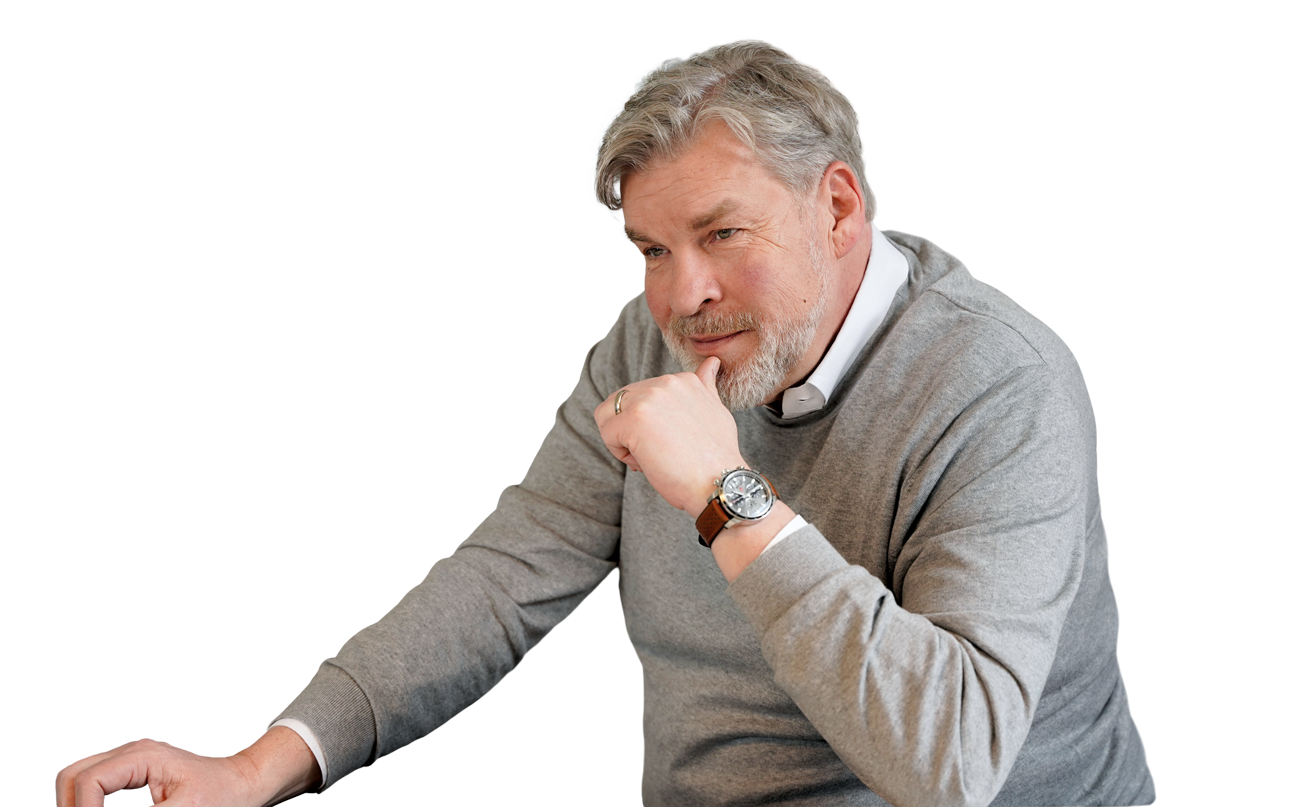
The technology: alternative fuels
“Here at REMONDIS, we believe in a mix of different fuels and have always been open to new kinds of technologies and alternative fuels,” Sascha Hähnke stressed. This means that both electric vehicles (EVs), powered by batteries or hydrogen fuel cells, and lorries run on biodiesel or biogas must be used to ensure the transition in the mobility sector is a success. “If we wish to be sustainable and systematically protect the environment, then we must back all the different types of technologies. We won’t be able to reach the finishing line if we opt for just one type,” Sascha Hähnke continued and he is certain that he is right here. All in all, REMONDIS and Rhenus operate around 10,000 lorries, more than 50 of which are EVs.
All in all, REMONDIS and Rhenus operate around 10,000 lorries, more than 50 of which are EVs.
Besides the publicly much discussed technologies involving electric motors, Sascha Hähnke pointed to a particularly exciting development that might actually mean that the good old internal combustion engine will not be completely banished to museums – on the contrary: the hydrogen combustion engine! Putting to one side the fundamentally manageable efficiency of engine combustion and the question whether there will be enough green hydrogen available, this technology could create some interesting advantages: Germany – the land of cars – has no questions about how the internal combustion engine works. It has the experience and the know-how and has in-depth knowledge about how to retrofit engines. Keyou, a start-up business based in Munich, has set about transforming conventional diesel engines into hydrogen engines. The core of the diesel engine remains unchanged here – just the necessary adjustments are being made so the engine can be run on hydrogen. Other companies are also looking at the option of doing this: in November 2023, for example, MAN Engines presented a hydrogen combustion engine for agricultural machinery and off-road vehicles that was also based on a diesel engine (D3876).
“This could be another interesting approach alongside the EVs powered with batteries or hydrogen fuel cells,” mused Sascha Hähnke. He wishes to continue to use other fuels, including biogas and biodiesel, in the future as well. “The CNG and LNG lorries in our fleet have proven to be very reliable,” he commented. The anaerobic digestion of biomass (e.g. organic waste, food waste, sewage sludge and slurry) produces a biogas that can play a key role in cutting carbon emissions – especially if Germany were more efficient at collecting its organic waste. If the very most were made of the country’s volumes of organic waste, then up to 100 terawatt hours of biomethane could be produced every year in Germany alone.
REMONDIS has made significant contributions towards the development and use of biodiesel since the beginning of the 21st century. In 2004, it set up a new business division dedicated solely to its biodiesel operations, which it runs under the brand name ‘ecoMotion’ – a move that led to an expansion of its production capabilities and distribution network at home and abroad. For many years now, articulated lorries, run on HVO (hydrogenated vegetable oil) and deployed by Rhenus and REMONDIS’ associated companies in the field of recycling logistics, have been successfully out and about on the roads in this tough day-to-day business.
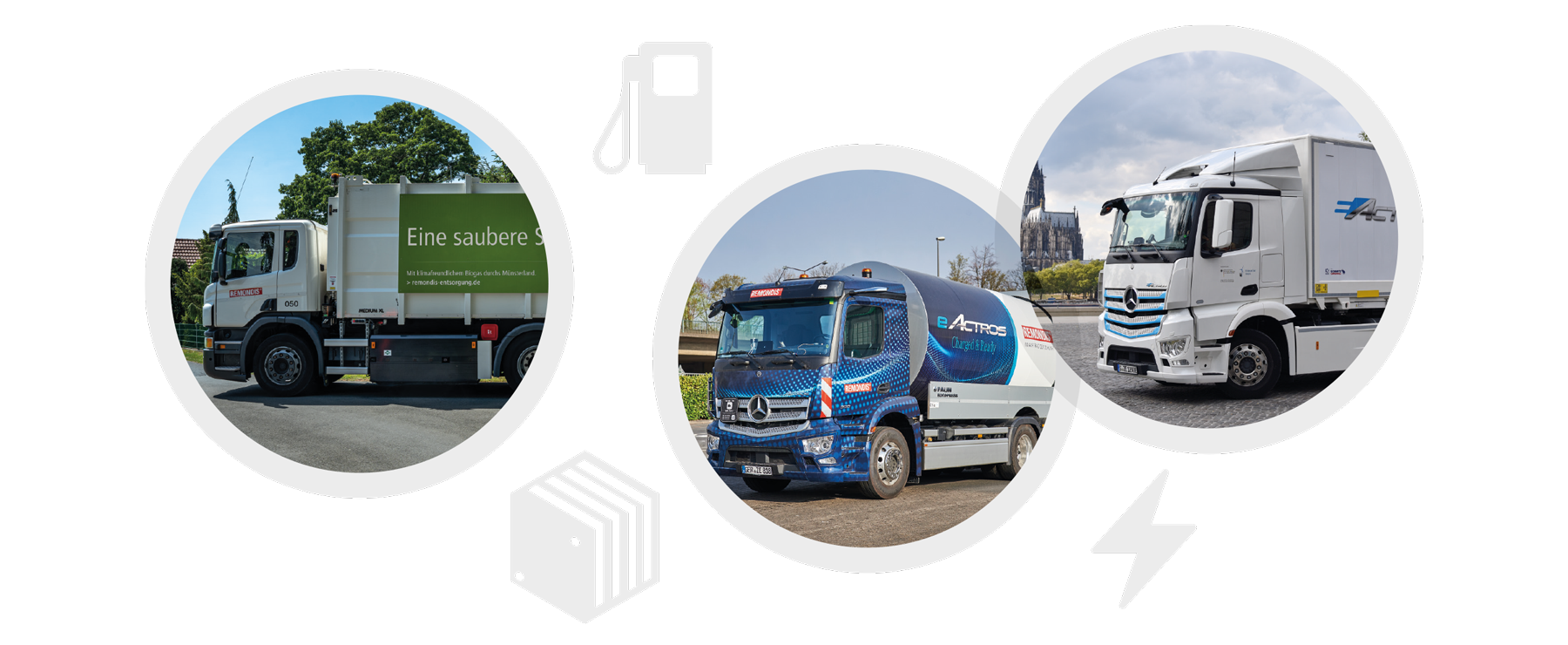
Electric lorries – powered by batteries or hydrogen fuel cells – are already the norm at many public and private sector waste management companies. But all potential systems must be sounded out here as well, Sascha Hähnke believes. One interesting fact: EVs are by no means a modern invention. The first electric vehicle was built by the French inventor Gustave Trouvé back in 1881 when he invented his electric Trouvé Tricycle. 21 batteries were used to power Charles Jeantaud’s electric car, which was presented in the same year that his fellow countryman Trouvé introduced his tricycle. Pushed into the background by the internal combustion engine, EVs enjoyed a bit of a revival in the 60s and 70s following the oil crisis. Nowadays, electrically powered vehicles are seen by many as the key to reducing carbon emissions. REMONDIS and Rhenus have trialled electric lorries in a variety of field tests, including a Mercedes eActros Gen 2, a DAF (VDL), an E-Force (Iveco) and a Volvo FH Electric. Many public sector circular economy firms already successfully deploy electric trucks powered by hydrogen cells (for example, from FAUN) to carry out their everyday business.
Sascha Hähnke mentioned other options that are also being considered as a way to meet climate targets, such as electric vehicles that have exchangeable batteries or get the power they need from overhead cables. Europe’s first ever automatic battery exchange station for heavy-duty commercial vehicles was commissioned in Lübbenau, a town located in Germany’s Spreewald region, in November 2023 as part of the ‘eHaul’ project. And three test stretches – so-called electric highways – have been built in Germany for electric trucks that get the power they need from overhead cables: on the A1 motorway near Lübeck, the A5 motorway near Frankfurt am Main and the B462 trunk road near Rastatt. As far as Sascha Hähnke is concerned, these are certainly interesting options. Especially for the fleets of vehicles operated by the public sector as it is not possible for all of their electric lorries to be recharged at the depots at the same time – the capacity is simply not there to do this.
“If the very most were made of the country’s volumes of organic waste, then up to 100 terawatt hours of biomethane could be produced every year in Germany alone.”
Sascha Hähnke, Managing Director of REMONDIS Sustainable Services GmbH
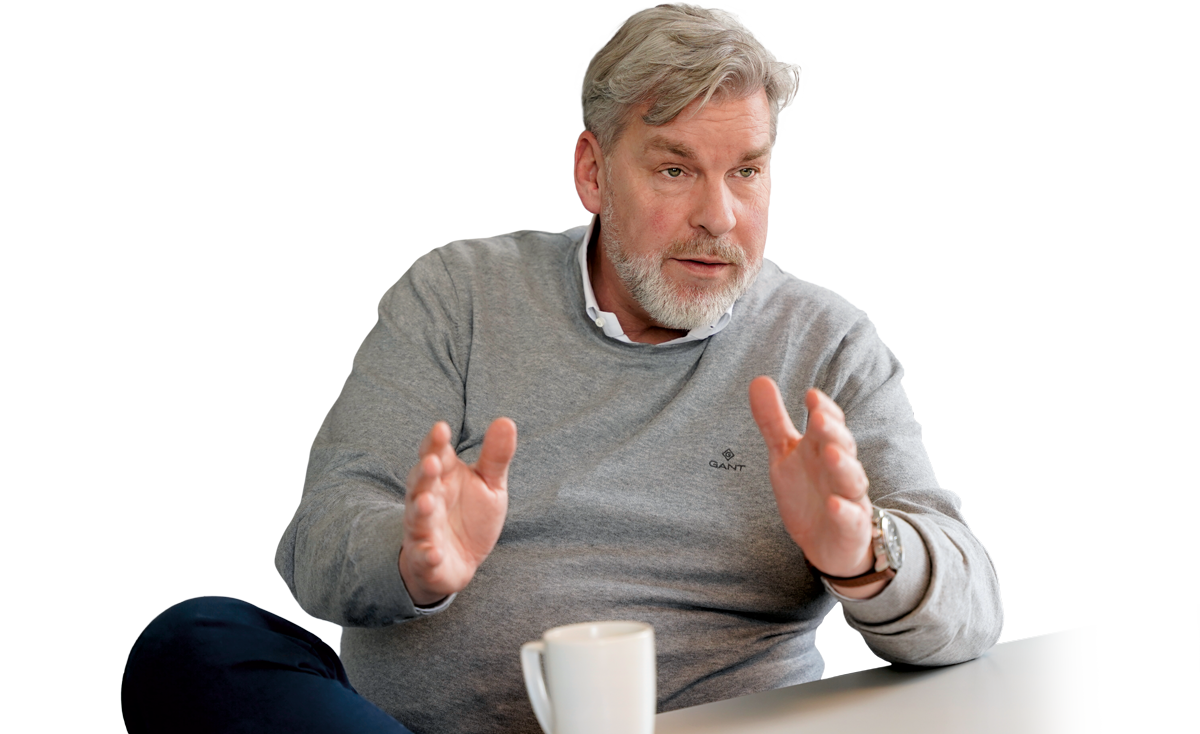
Sascha Hähnke
A qualified freight forwarding specialist, Sascha Hähnke worked for several transport logistics companies before joining the Rhenus Group in 2004 as managing director of Rhenus Forest Logistics, a specialist wood transport business. Two years later, he was appointed head of the Group’s Road Division. In 2018, he then took on the position of managing director of Rhenus Transport GmbH & Co. KG, a company responsible for organising all of Rhenus’ bulk cargo transport activities (road, rail & ship).
Sascha Hähnke has been a managing director of REMONDIS Sustainable Services GmbH since February 2023. His role here is to manage and drive forward the use of alternative fuels in road freight transport within the RETHMANN Group. He has also sat on a number of committees: he was a member of the former AG Verkehr and other task forces set up to support the Federal Ministry of Transport and continues to serve on customer/expert advisory boards for commercial vehicle manufacturers. Born in the German town of Bielefeld, Sascha Hähnke is 55 years old, married and has two children.
Infrastructure
One thing that bothers Sascha Hähnke when he listens to the discussions about alternative fuels is that they are sometimes a little detached from reality – for example when talking about the charging infrastructure in Germany. “It really is a fairy tale to believe that all lorries can recharge their batteries at the truck stops,” he said, giving an example. There are far too few charging stations with sufficient capacities available. And it is practically impossible to extend the network in some places (for example, at the simple motorway parking areas that only have toilet facilities) as the cables first have to be laid or substations even built – a very costly enterprise. “Let’s not forget that the federal government hasn’t even succeeded in building enough parking spots for lorries – let alone with charging stations. So what does all this mean? At the end of the day, we’ll have to build two parallel sets of infrastructure: one for diesel lorries and one for electric ones,” concluded Sascha Hähnke.
Subsidy programmes
Talking about the commitment of federal government: the amount of work that must be done to convert many parts of the country’s mobility sector is huge and it would seem to be self-explanatory that this will only be possible with the help of subsidies. Which is why logistics experts find it totally incomprehensible that a clear pathway has not been set out here. “Many firms simply can’t plan ahead and we’re already going through a more than difficult time with the current wars, crises, inflation and changing global trade routes,” Sascha Hähnke warned. Subsidies for climate-friendly commercial vehicles are coming to an end this year and he believes this will have a significant impact. “Other countries were envious of our KsNI subsidy programme even if it wasn’t managed particularly well,” explained Sascha Hähnke. Instead of the three calls for funding each year, there was, for example, only one. Speed was another important factor both regarding the processing of the applications and the pre-financing of the investments. “Many small companies simply can’t cope with the latter on their own,” said Hähnke, summing up the situation.
“As far as I’m concerned, there’s no alternative to alternative fuels, especially in recycling logistics.”
Sascha Hähnke, Managing Director of REMONDIS Sustainable Services GmbH
Financing
Finances play, and will continue to play, a major role both in making the transition a success and maintaining the existing infrastructure. Lorries also contribute towards this as they have to pay HGV road tolls: half of the money collected from the HGV road toll scheme (minus the costs for collection, enforcement and toll compensation measures) is spent on the country’s federal highways and the other half on mobility measures that predominantly involve the country’s rail systems. On its website, the Federal Ministry for Digital and Transport writes: “In 2022, the scheme generated about 7.4 billion euros. Given the urgent need for investment in the structural maintenance and upgrading of the transport network, the tolling scheme makes a major contribution to transport infrastructure funding”. So far, so good. On the 01 December 2023, the HGV toll was extended to include a CO2 levy for vehicles weighing 7.5 tonnes or more – something that led to a massive increase. This regulation will also apply to lorries weighing between 3.5 and 7.5 tonnes from 01 July 2024 onwards. The government expects the regulation that came into force on 01 December 2023 alone to bring in an additional 26.61 billion euros between 2024 and 2027. “This is a disaster for our sector and it really is incomprehensible that we are asked to pay even more and that this money is then spent on the Deutsche Bahn’s rail system,” commented Sascha Hähnke.
There’s no alternative to alternative fuels
If the mobility sector is to be successfully transformed, then there is still much to do – technologically, financially and administratively. “As far as I’m concerned, there’s no alternative to alternative fuels, especially in recycling logistics,” said Sascha Hähnke, pointing to the many exciting approaches that are being used and tested in the field. “We can achieve a great deal if we all work together and are open to new kinds of technologies and, above all, if we base our decisions on the facts and have the courage to implement such projects – I’m absolutely convinced of this,” concluded the managing director of REMONDIS Sustainable Services.
Image credits: image 1: Shutterstock: Sahul Jabir; image 2, 3, 4: © REMONDIS







